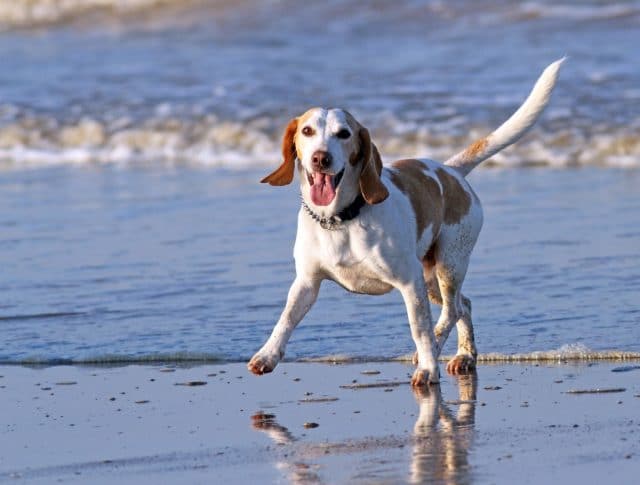
Although we all know that it’s best to give your dog proper dog food, it’s fine to give her the occasional human-oriented treat.
Do please bear in mind, though, that all dogs are different and they all have different taste buds. So it’s best practice to only ever feed your dog small amounts of the following foods.
And if your dog reacts unusually to any of them, do take her to the vet’s.
Here Are 10 Foods That Are OK To Give To Your Dog:
- Chicken – cooked, unseasoned chicken is a great addition to her usual diet and if you’re low on dog food in the house, then it’s a satisfying meal replacement.
- Salmon – a fantastic food for both humans and dogs, thanks to the omega-3 fatty acids that it contains. A great benefit of cooked salmon is a healthier-looking, shinier coat for your dog.
- Eggs – make sure that the eggs are cooked well, as raw or undercooked eggs could contain salmonella. And don’t give your pooch too many, as they are high in fat.
- Cottage cheese – high in protein and calcium, this is a great food to give to your dog. However, some dogs have a problem properly digesting dairy foods, so if this is the case with your furry friend, then best to avoid it.
- Broccoli – rich in vitamins, this wonderful green vegetable is a fabulous treat for your dog in small amounts. It’s a great source of vitamins K and C, and also provides lots of potassium and fiber.
- Oatmeal – this is another great source of fiber. Just make sure that you cook the oatmeal and avoid adding any sugar or sweeteners.
- Green beans – these contain lots of iron and vitamins, are highly nutritious and low in calories.
- Carrots – similarly to broccoli, carrots are also high in fiber and vitamins and low in calories. A nice crunchy carrot can help to make your dog’s teeth stronger.
- Pumpkin – this delicious winter squash is a great source of fiber and vitamin A. Feed it to your dog either raw or in a can.
- Yogurt – if your dog suffers from digestion problems, then feeding her some plain yogurt could really help her. Plain yogurt has high levels of calcium and protein. You’ll just need to check that the yogurt doesn’t contain any added sugar or sweeteners.
And Now For 5 Foods That Are Harmful To Your Dog:
- Alcohol – OK, it’s not really a food, though the FDA does regulate the labeling of some beers and some wines. However, unsurprisingly, alcohol is not good for your dog at all, even in small amounts. Alcohol can cause your dog to vomit, give her seizures and even lead to her death. So don’t ever give her any. Period.
- Raisins and grapes – although nice, healthy food for humans, raisins and grapes are poisonous for dogs and at worst, can cause kidney failure. Again, don’t ever give them any.
- Chocolate – chocolate that’s fit for human consumption contains stimulants called methylxanthines. Methylxanthines occur naturally in foods such as cocoa, coffee, guarana and tea. These stimulants are very bad for your furry friend and similarly to alcohol, can cause vomiting and seizures and even lead to a premature death. Please note that the above information does NOT relate to “doggy chocolate”, which is made WITHOUT any of the substances that are harmful to dogs.
- Avocado – whilst it’s true that the seed, bark and leaves of an avocado contain a toxin called persin, dogs and cats don’t seem to be affected by the toxin. However, what CAN present a problem for our dogs, is if they swallow the avocado seed. It’s a very large seed and can easily get stuck in the dog’s esophagus, stomach or intestinal tract. This could potentially lead to an upset stomach and breathing difficulties.
- Onions – all onions, whether raw or cooked, present a danger to your pooch. This is because onions contain compounds which can be toxic to your dog if swallowed. These compounds can cause your furry friend’s red blood cells to become very fragile and burst, leading to vomiting, diarrhea, a raised heart rate and breathlessness.
Other Similar Articles You May Also Enjoy:
Take a look at our comprehensive article on how to make your dog happier
If you want a healthier dog (and who doesn’t?), then take a look at these 8 vet-recommended foods for your pup
There are various reasons why your dog might be underweight, especially if it’s a rescue dog. Here’s how to help your dog gain weight safely and sensibly








